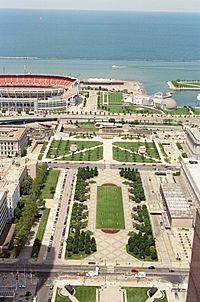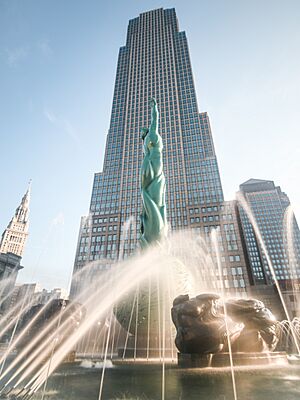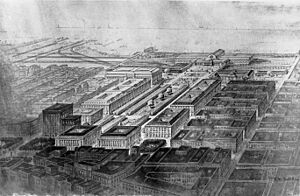The Mall (Cleveland) facts for kids
Quick facts for kids |
|
|
Cleveland Mall
|
|

View of the Mall, looking north, toward Lake Erie before the northern sections were rebuilt 2011-2013.
|
|
| Location | Roughly T-shaped mall area between E. 9th and W. 3rd Sts., Cleveland, Ohio |
|---|---|
| Area | 26 acres (11 ha) |
| Architect | Daniel Burnham, et. al |
| Architectural style | Beaux Arts |
| NRHP reference No. | 75001360 |
| Added to NRHP | June 10, 1975 |
The Cleveland Mall is a big public park located in downtown Cleveland. It is one of the best examples of the "City Beautiful" design style in the United States. This movement aimed to make cities more beautiful and organized.
History of the Cleveland Mall
The idea for the Mall came from the Group Plan in 1903. Important architects like Daniel Burnham, John Carrère, and Arnold Brunner created this plan. They wanted a huge public space surrounded by the city's main government and public buildings. All these buildings were designed in a classic, grand style called neoclassical.
Many of these buildings were built over the next 30 years. These include:
- The Metzenbaum Courthouse (1910)
- The Cuyahoga County Courthouse (1912)
- Cleveland City Hall (1916)
- Public Auditorium (1922)
- The main Cleveland Public Library building (1925)
- The Cleveland Public Schools Board of Education building (1931)
Other important buildings nearby are Key Tower, the Global Center for Health Innovation, the Hilton Cleveland Downtown Hotel, and the Federal Reserve Bank of Cleveland.

The "City Beautiful" movement wanted to change old, run-down areas into amazing public spaces. The plan was for the Mall to end at Lake Erie with a grand train station called Union Terminal. However, the station was later built in a different spot, at Public Square, and became the Terminal Tower.
Even though the whole plan wasn't finished, a lot of it was built. This makes the Cleveland Mall one of the most complete examples of the City Beautiful movement in the country. The Mall was added to the National Register of Historic Places in 1975. This means it's a special place recognized for its history.
The Mall is split into three parts: Mall A, Mall B, and Mall C. Mall A, at the very south, is called Veterans' Memorial Plaza. Mall C was named Strawbridge Plaza in 2003. The Memorial Plaza is where you can find the Fountain of Eternal Life. This fountain, also known as the War Memorial Fountain, was created by Marshall Fredericks.
Underneath Malls B and C, the Cleveland Convention Center was built in 1964. In 2010, the county bought this underground center. They started a big project to rebuild it. They also built the Global Center for Health Innovation and the Hilton Cleveland Downtown Hotel. The new Huntington Convention Center of Cleveland opened in 2013. It has underground paths to Public Auditorium and the Global Center for Health Innovation. The Hilton hotel opened in June 2016. After all the building work, Mall B and Mall C became mostly grassy areas again. Mall B is now 27 feet higher than the sidewalk in some places.
Public Art at the Mall
Cleveland Public Art has put up many temporary public art displays on Mall B. These art pieces are only there for a short time.
In 2004, New York artist Brian Tolle created a work called For the gentle wind doth move Silently, invisibly. It had eight tall styrofoam sculptures that looked like classic urns. These sculptures were shaped to show how the wind actually blew from Lake Erie. They were removed in 2006.
In May 2008, Peter North and Alissa North from Toronto created The Verdant Walk. This art piece included native grasses and seven sculptures covered in fabric. At night, the sculptures lit up using solar-powered LED lights. They stayed there until 2010.
See also
 In Spanish: The Mall (Cleveland) para niños
In Spanish: The Mall (Cleveland) para niños
 | Claudette Colvin |
 | Myrlie Evers-Williams |
 | Alberta Odell Jones |



